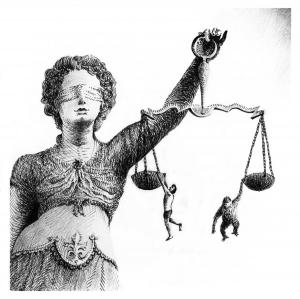
By Kathryn Lyon ’13
Illustration by Evan Lorenzen ’13
Suppose you were to come across a human and an ape dangling from the side of a cliff. The two are of arguably equal intelligence and have an equal capacity for suffering. You might correctly assess that both creatures have the same interest in being alive. This being said, how do you choose which being to save, or which to save first? Which choice is morally correct? These questions concern not morality in general, but rather our moral obligations to animals.
Morality is a human notion. Despite this, some animal rights advocates argue for moral laws across the animal kingdom. Martha Nussbaum, for example, proposes “the gradual formation of an interdependent world in which all species will enjoy cooperative and mutually supportive relations with one another.” Apparently, she suggests replacing what is natural with what she views as just. But Nussbaum disregards the fact that animals have no concept of morality themselves.
For example, a lion does not take a gazelle’s interests into perspective before attacking it. Peter Singer, author of All Animals Are Equal, might claim that the lion is acting “speciesist”—allowing the interests of its own species to override the greater interests of other species. Singer would view it as our human duty to interfere on behalf of the gazelle, ensuring that both animals’ interests are equally considered. But only by human standards could putting one’s own species above others ever be seen as wrong; every other species on the planet puts its own interests first. So while theories of animal morality determine appropriate human treatment of animals, they cannot regulate interaction between other animal species.
 Because we are human we value human life above animal life, and thus our survival above theirs; we hold our own interests above those of other animals. If we were to consider only our own interests, “morality” would not even enter into the equation. The more comfortable we are within our lifestyles, however, the more apt we are to establish rules and regulations regarding morality or ethics. Because we are not directly competing with other species for survival, we can take their interests into account. In doing so, I believe we have the responsibility to recognize that we cannot cause animals to suffer in exchange for mere human wants.
Because we are human we value human life above animal life, and thus our survival above theirs; we hold our own interests above those of other animals. If we were to consider only our own interests, “morality” would not even enter into the equation. The more comfortable we are within our lifestyles, however, the more apt we are to establish rules and regulations regarding morality or ethics. Because we are not directly competing with other species for survival, we can take their interests into account. In doing so, I believe we have the responsibility to recognize that we cannot cause animals to suffer in exchange for mere human wants.
Every sentient being has an interest in avoiding pain. I maintain that their interests should not be compromised for anything less than the human interest in avoiding pain. Thus, harmful practices that do not alleviate human pain and suffering, such as the use of animals in the entertainment industry or for cosmetics testing, are not morally justified. Regarding animals as test subjects for medical research, human bias dictates that they should be used before we use members of our own species—but only in situations where researching upon a human would also be justified. In other words, while the discriminatory practice of testing on animals before humans is not immoral, unnecessary harm to sentient animals is.
Similarly, while consuming animals is not inherently immoral, if we have the means to survive as vegetarians, we have the moral responsibility to avoid killing animals for food out of respect for their lives and their interests in being alive. Because we would not eat humans, we should not eat animals. However, in situations where vegetarianism is not an option, it is not immoral for people to survive by eating animals. When survival is at stake, surely it is “better” to eat an animal than a person.
Returning to the cliff-hanging scenario, it is clear that a moral, rational human would save the person first. Despite idealist theory, the obligation to our own species demands that we sacrifice the ape to save the human. Any moral code must be subjective, as it may change according to the specific situation in which it is applied. Human existence is a balance between following the most moral practices one can and surviving.
I recognize that from a universal perspective this is not “fair” to non-human animals; however, as humans we owe our loyalty to the species Homo sapiens. Human perspective is inherently biased, but it is the only perspective from which we can address this issue. It is impossible for humans to truly consider moral equality for animals when we have our own interests in survival at stake. What is immoral is for humans to hurt animals unnecessarily or kill them frivolously. Whenever the resources exist to do so, animal life or suffering must be spared. We have a moral duty to the animals of this world, but foremost we have a duty to our species.
Kathryn Lyon is a sophomore at Marlboro and winner of last year’s Freshman/Sophomore Essay Prize, awarded each year for the best essay written for any course. This article is adapted from her essay, “Animal Morality in Concentric Circles,” written for her Environmental Philosophy class.

